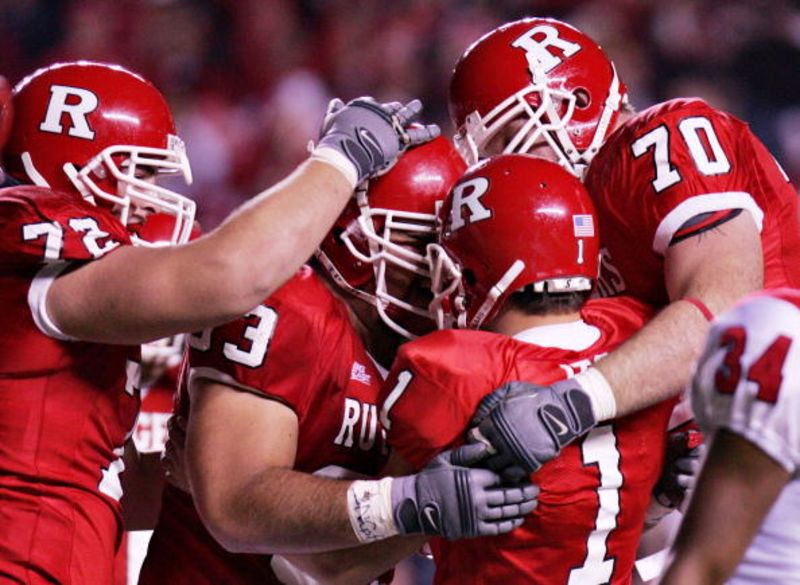
Photographer: Emile Wamsteker/Bloomberg
I’m no fan of the tycoon-friendly, deficit-expanding tax bills that House and Senate Republicans have written. But there’s one surprising sphere of economic life where the two plans actually offer marked improvements over the status quo: college sports.
College sports, of course, are big business; they generate around $13 billion a year in revenue. If college athletics were a publicly traded corporation, it would rank 216 on the Fortune 500, just below Kellogg Co.
Yet for tax purposes, athletic departments are treated as part of a university, which means they are essentially tax-exempt. What’s more, boosters get the same tax breaks for contributing to the athletic department as they would get for donations to a new science center: 80 percent of the contribution is tax deductible.
And how do boosters contribute to athletic departments (aside from handing cash under the table to athletes)? One way is by giving to capital campaigns to build or renovate facilities. But another way is to give money to a particular team in order to claim a season ticket in the most desirable part of the stadium.
In professional sports, they have a straightforward term for this fee: it’s called a seat license. Universities avoid such a crassly commercial term. Instead they use words like “donations” or “contributions” or “premium seating programs.”
For instance, in 2016, the University of Florida football team generated $82.3 million 1in revenue. Of that amount, $35.6 million came from ticket purchases, which are not deductible. But another $42.7 million came from “contributions from Gator Boosters, Inc.,” a tax-exempt charity that allocates tickets to football and basketball games based on contributions. The more you contribute, the better your seat.
Ditto at the University of Texas, Notre Dame, Ohio State University–and everywhere else big-time college football is played. And a big reason these schools can charge as much as they do—upwards of $25,000 in many cases—is because the guy buying a seat license gets the same 80 percent deduction as the guy giving money to the science center.
But as John Colombo, a law professor at the University of Illinois has pointed out, seat licenses are not donations. “If you receive a quid pro quo,” he told McClatchy Newspapers some years ago, “it’s considered not to be a donation. The IRS has held that position forever. And it has been upheld by the court.” But in the 1980s, after the Internal Revenue Service tried to enforce its position, Congress passed a law exempting mandatory donations for college sports tickets.
In an email to me, Colombo wrote, “Big time college sports is already a cesspool of money, and the federal government doesn’t need to be subsidizing 50-yard-line seats or skyboxes at the University of Alabama or Notre Dame, or Michigan or anywhere else.”
Amazingly, both the House and the Senate now appear to agree with Colombo. A spokesman for Kevin Brady, the chairman of the House Ways and Means Committee—and a Texan—told the Austin American-Statesman that the deduction is “the epitome of a special-interest loophole” and that it was forcing taxpayers to “subsidize front-row seats and luxury boxes for wealthy boosters.” Which is completely accurate. It is absurd to treat seat licenses like contributions to an engineering school, and it’s nice to see Congress finally acknowledging that.
Additionally, the House tax bill calls for a 20 percent excise tax against the salaries of the five highest-paid executives of a nonprofit organization once those salaries top $1 million. For most nonprofits, this will have little or no effect. But for universities in general, and athletic departments in particular, this could be a very big deal.
Remember that map that circulated a few years ago showing the highest paid employee of each state? I went back and looked at it recently; every single one worked for a university, including 27 football coaches and 13 basketball coaches. And those coaches can make enormous sums: $11 million for Nick Saban, the football coach at the University of Alabama; $7 million for Duke basketball coach Mike Krzyzewski; $6 million or so to Jim Harbaugh at the University of Michigan. Alabama also has some assistant coaches making over $1 million, so that excise tax could really add up. If it were to become law, it might actually put a damper on the pay of college coaches. It’s long overdue.
The Senate, meanwhile, has another idea to tax university revenue that’s unconnected to education. It wants to tax royalties generated from a university’s name or logo. This would apply to both athletic and non-athletic merchandise, but it would no doubt have its biggest effect on things like jersey or sweatshirt sales, which have become nice little tax-free profit centers in recent years.
If I had my druthers, the bills would go further. One thing I would tax is the revenue athletic departments get from apparel companies like Nike or Adidas. Taken together, that money runs into the hundreds of millions each year.
Still, what the House and Senate have proposed is plenty good enough, at least as a starting point. It’s an acknowledgement that college sports is not just another extracurricular activity, but rather a profit-maximizing enterprise using its affiliation with universities to duck taxes it really ought to be paying.
I can’t say I’m rooting for the tax bills to become law. But if they do, seeing college sports taxed like the business it is will almost make it worth it.
[“Source-bloomberg”]
